Use Cases
Constructive Game-Based Learning
Constructive Game-Based Learning (GBL) integrates constructivist pedagogical principles with interactive gamification and Game-Based Learning elements to create engaging educational experiences. This approach is essential for enhancing active learning environments where students build knowledge through exploration and experimentation. The seminar "Game-Based Learning - Development of Interdisciplinary Learning Games" at the University of Zurich exemplifies this approach by guiding students through a structured framework that encourages creativity and problem-solving.
The seminar includes going through a Design Thinking Process (DTP) that involves understanding complex problems, observing and synthesizing information, ideating solutions, prototyping game concepts, and testing these prototypes. This comprehensive process ensures that students can apply theoretical knowledge practically while receiving feedback from peers and instructors. This use case provides a brief overview of Constructive GBL by integrating theoretical insights with practical applications from the seminar.
Theoretical Background
A constructivist pedagogical approach emphasizes that knowledge is actively constructed by learners rather than passively received from teachers – thus, learners construct knowledge based on their own experiences. Constructivist theories, particularly those by Piaget (1952) and Vygotsky (1978), provide a foundational framework for understanding how learners actively construct knowledge. Piaget's theory of cognitive development emphasizes stages where learners assimilate and accommodate new information to build complex understanding. His work suggests that learners are active agents in their education, constructing knowledge through interactions with their environment (Piaget, 1952).
Vygotsky's theory, on the other hand, highlights the social dimensions of learning. He suggests that learners can achieve higher levels of understanding through interactions with peers as well as instructors with more knowledge (Vygotsky, 1978). This social constructivist perspective underscores the importance of collaborative learning environments where dialogue and interaction enhance deeper understanding. In the context of GBL, these theories support the use of games as dynamic environments where learners can explore, experiment, and apply concepts in real-world scenarios.
Example seminar “Game-based learning - development of interdisciplinary learning games”
The seminar "Game-Based Learning - Development of Interdisciplinary Learning Games" at the University of Zurich is designed to enable students to experience game development through the lens of design thinking.

This course equips participants with the skills to develop educational games that integrate various disciplinary perspectives. Students engage in a structured process that includes understanding stakeholder needs, observing real-world contexts, synthesizing information, ideating creative solutions, prototyping game concepts, and testing these prototypes with stakeholders. The seminar emphasizes collaboration and innovation, encouraging students to apply theoretical concepts in practical settings.
This year’s slogan was "Sustainability Across Disciplinary Borders," reflecting the seminar's focus on interdisciplinary collaboration to address interdisciplinary sustainability challenges.
Learning Goals
The seminar aims to achieve several key learning goals:
- Interdisciplinary Collaboration: Students gain experience working across disciplinary boundaries, building networks that enhance their ability to tackle complex problems collaboratively.
- Creative Problem-Solving Skills: Participants develop innovative solutions by engaging in creative processes that challenge conventional thinking.
- Didactic Communication: Students learn to present complex topics in an accessible manner, enhancing their ability to communicate effectively.
- Game Development Competence: The seminar equips students with essential skills in game design and development.
- Project Management Skills: Through practical settings, participants strengthen their project management capabilities.
- Contribution to Global Sustainability Challenges: Students are encouraged to contribute meaningfully to addressing global sustainability issues through their projects.
Implementation Details
The seminar "Game-Based Learning - Development of Interdisciplinary Learning Games" at the University of Zurich exemplifies constructive GBL by guiding students through a structured DTP adjusted for game development:
- Understand: Students begin by comprehending the task or question at hand, identifying stakeholders such as students and lecturers. This step includes defining relevant topics for games and clustering ideas into themes. The students set up the project.
- Observe: Participants gather insights by observing relevant contexts, such as lectures or lecture materials, and engaging with stakeholders to understand challenges that could be addressed through game-based solutions. Surveys and research on existing games are conducted to inform this phase.
- Synthesis: Students consolidate observations to identify key themes and challenges, evaluating surveys to prioritize topics needing innovative game-based approaches. Teams decide on which problem to focus their creative efforts.
- Ideation: Creative brainstorming sessions generate diverse ideas for solving identified challenges. This step involves defining learning objectives and exploring existing games for inspiration. Workshops encourage collaboration among diverse teams to enhance creativity.
- Prototyping: Students bring their ideas to life by developing a playable prototypes to test technological feasibility, ensuring alignment with educational goals. Tools like idea napkins help in elaborating game concepts, while software like Excel or Balsamiq assists in modelling and visualization.
- Testing: Prototypes are tested with stakeholders who provide structured feedback, focusing on refining game designs based on real-world interactions. Testing sessions are organized to gather insights for improvement.
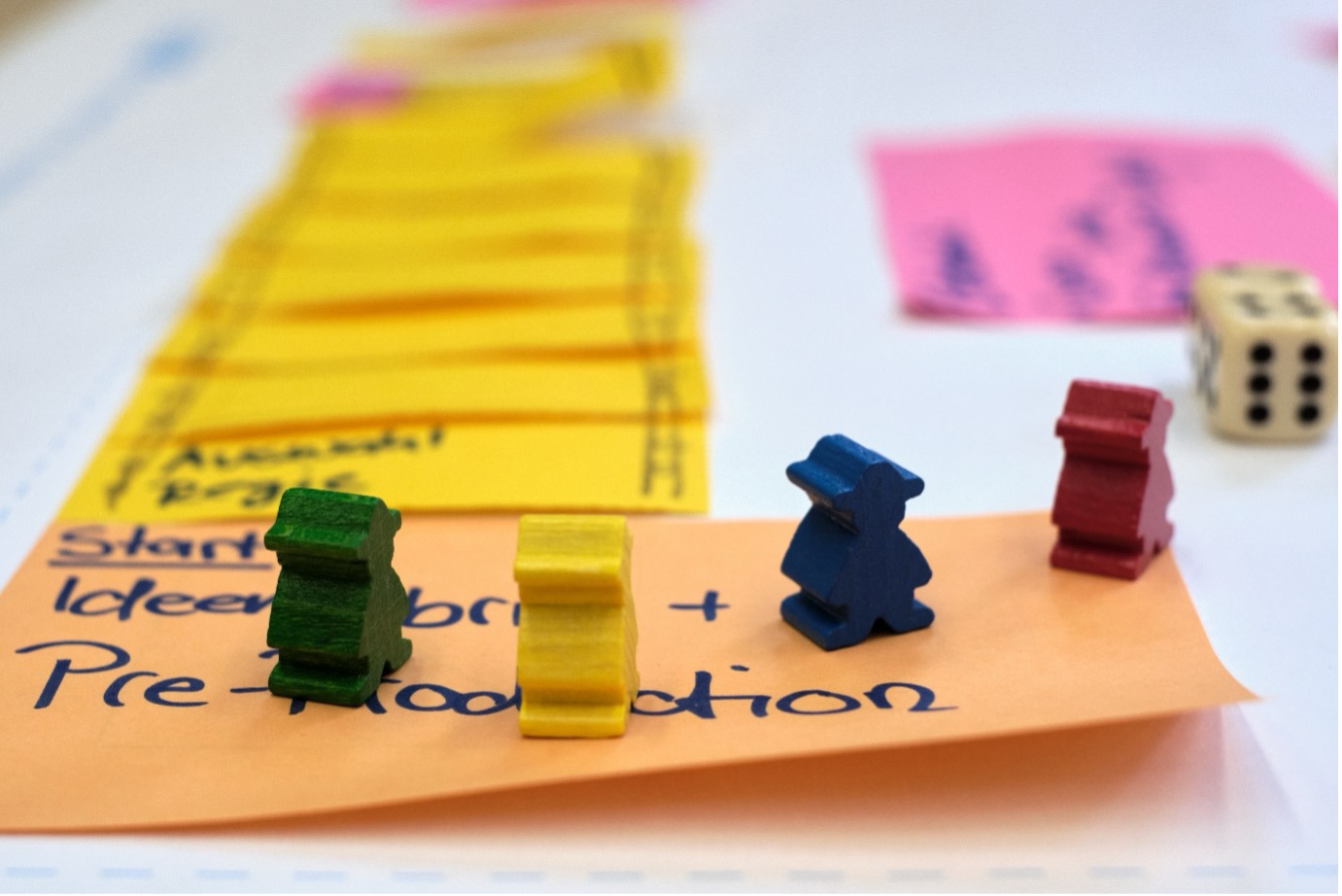
- Iteration and Next Steps: This phase involves reflecting on insights from initial testing and planning further actions. Students refine their prototypes based on feedback, ensuring alignment with user needs and educational goals. This iterative approach emphasizes continuous learning and adaptation.
Due to time constraints and the GBL-focus, some steps of the classic DTP have been modified to suit the seminar schedule. Within the seminar, the platform Miro has been used for documentation and transparency, allowing student groups to collect and share materials effectively. Other digital or physical platforms (e.g. pinboards) could also have been used for gathering a visual overview of the course of the process.
Practical Outcomes
Within the seminar, interdisciplinary student groups each developed one game prototypes addressing real-world issues:
- A Story of Sustainability - Little Red Riding Hood's Journey: This digital escape room integrates physical elements to teach sustainability concepts. It targets a broad audience beyond university students, aiming to raise awareness about sustainability goals through interactive storytelling. Subject-specific team constellation: Banking & Finance / Sustainable Finance, Economics / Behavioral Economics, Psychology
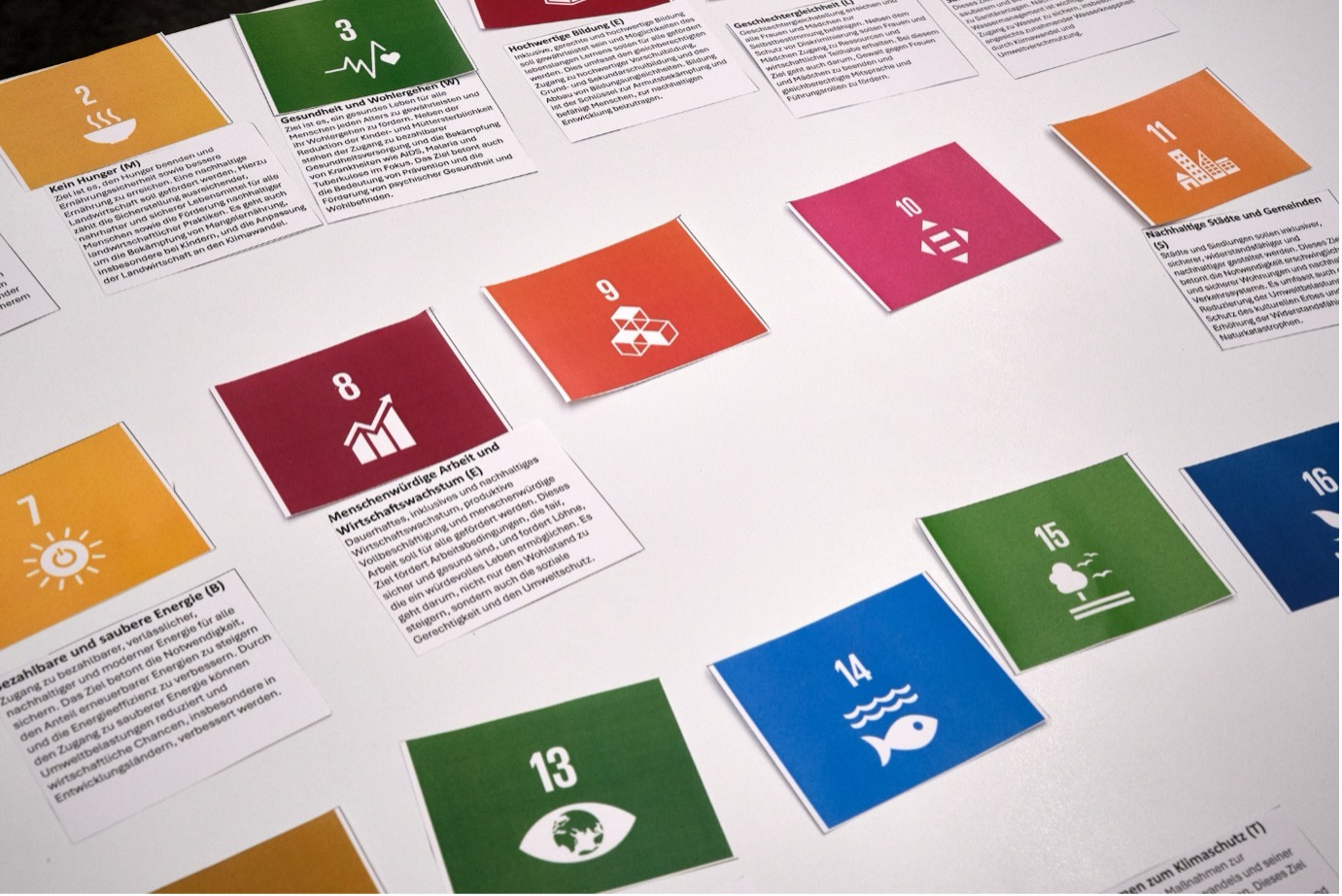
- EcoTrade: Focused on certificate trading, this game challenges university students to understand pricing mechanisms in environmental contexts. It involves digital elements that simulate market conditions, encouraging strategic thinking about sustainability initiatives. The idea for the game is being refined in a master's thesis and will be used as part of a larger simulation. Subject-specific team constellation: Educational Science / Social Science, Computational Linguistic and Language Technology / Informatics, Banking and Finance / Information Systems, Banking and Finance / Accounting and Finance

- Studio Tycoon: This game teaches the economics of film production in a playful manner. Targeted at first-year university students and high school students, it simulates the entire cycle from pre-production to post-production, helping players understand business decisions in the film industry. Subject-specific team constellation: Film Science, Business Administration / Sustainable Finance, Banking and Finance / Sustainable Finance
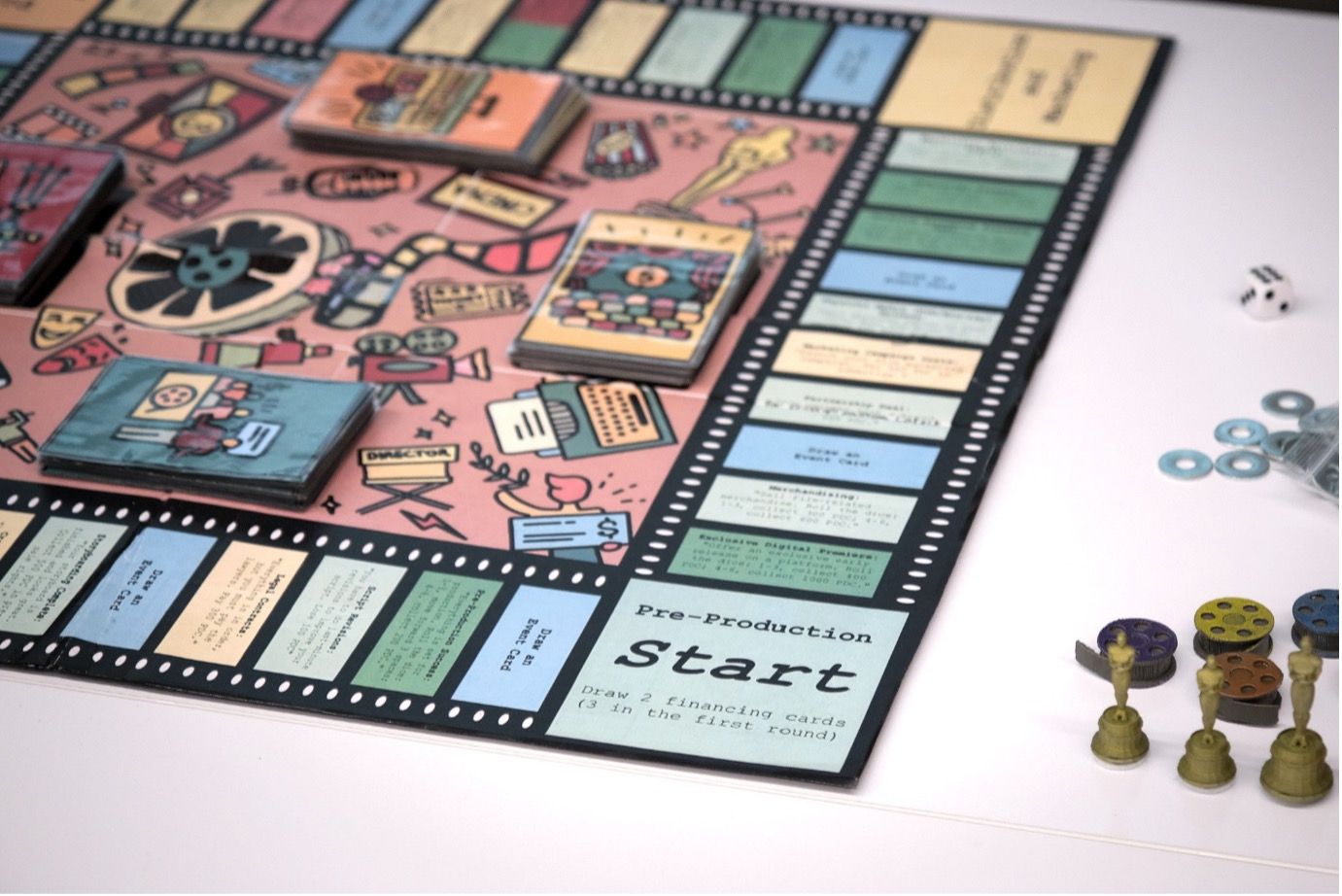
These projects allowed students to collaborate across disciplines, applying theoretical knowledge from various disciplines practically while receiving feedback from peers and instructors. The iterative design process encouraged continuous improvement and adaptation based on testing outcomes.
Competencies and Future Skills
Incorporating Constructive Game-Based Learning (GBL) equips students with essential skills for the modern world. These skills are crucial for navigating complex challenges and fostering innovation:
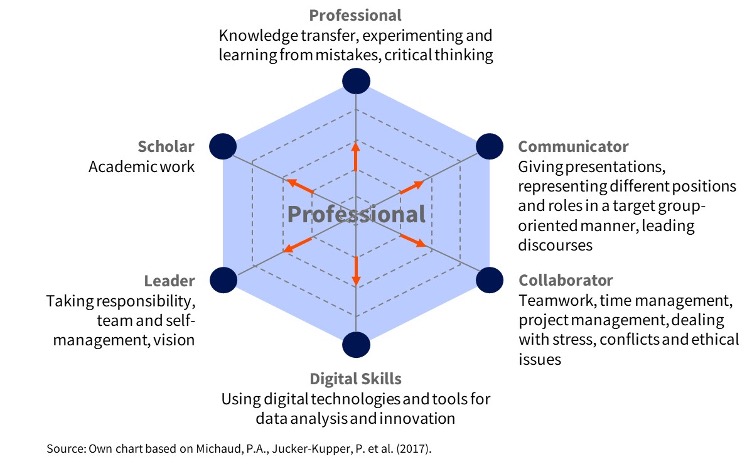
- Professional: Through Constructive GBL, students enhance their ability to transfer knowledge, experiment, and learn from mistakes, fostering critical thinking and adaptability.
- Communicator: Participants improve their presentation skills and ability to represent different perspectives effectively, facilitating group-oriented discussions.
- Collaborator: The seminar strengthens teamwork, time management, and project management skills, while also helping students navigate stress and conflicts.
- Leader: Students take on responsibilities and refine their team and self-management skills, developing a clear vision for leadership roles.
- Digital Skills: Participants gain experience using digital technologies and tools for collaboration (e.g. Miro) and innovation, preparing them for future challenges.
- Scholar: The seminar reinforces students' capabilities in conducting academic work, integrating interdisciplinary theoretical knowledge in practical applications.
These future skills empower students to become versatile professionals capable of leading and innovating in diverse environments.
Recommendations
For effective implementation of Constructive GBL:
- Integrating design thinking frameworks is a possibility for guiding game development effectively. Educators should focus on creating structured yet flexible processes that encourage creativity while maintaining clear objectives.
- Encouraging collaboration among diverse teams enhances creativity by bringing together different perspectives and expertise. Interdisciplinary teams offer additional learning experiences by facilitating exchanges across content borders. This diversity enriches the development process by incorporating varied insights and expertise from different fields, leading to more innovative solutions.
- Additionally, introducing students to gamification and GBL concepts prepares them for future work environments where these skills are increasingly valued. Understanding how to leverage game mechanics for engagement can enhance project management, marketing strategies, and team dynamics in various professional settings.
- Anticipating potential barriers such as resource limitations is essential for smooth implementation. Providing clear guidance and support materials can help overcome these challenges by ensuring all participants have access to necessary resources and understand the process thoroughly.
- Additionally, incorporating regular feedback loops (e.g. individual group coaching, peer-feedback) allows for continuous improvement based on participant experiences.
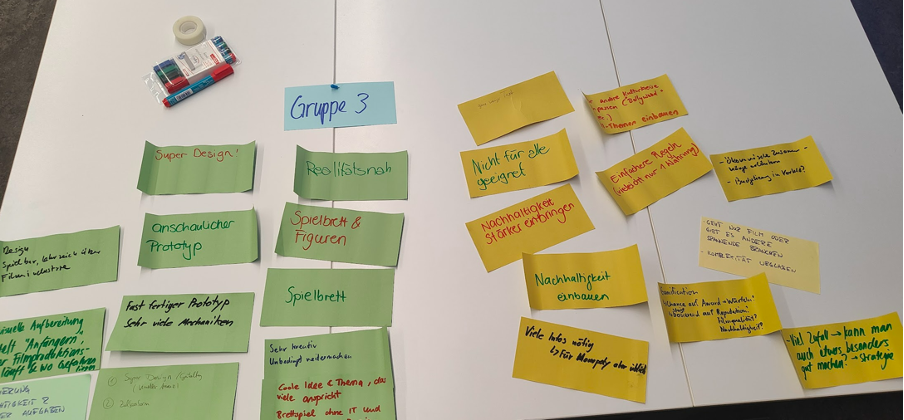
By following these steps, educators can successfully incorporate Constructive GBL into their curricula, creating interactive and meaningful learning experiences that are both engaging and educationally valuable for their students.
